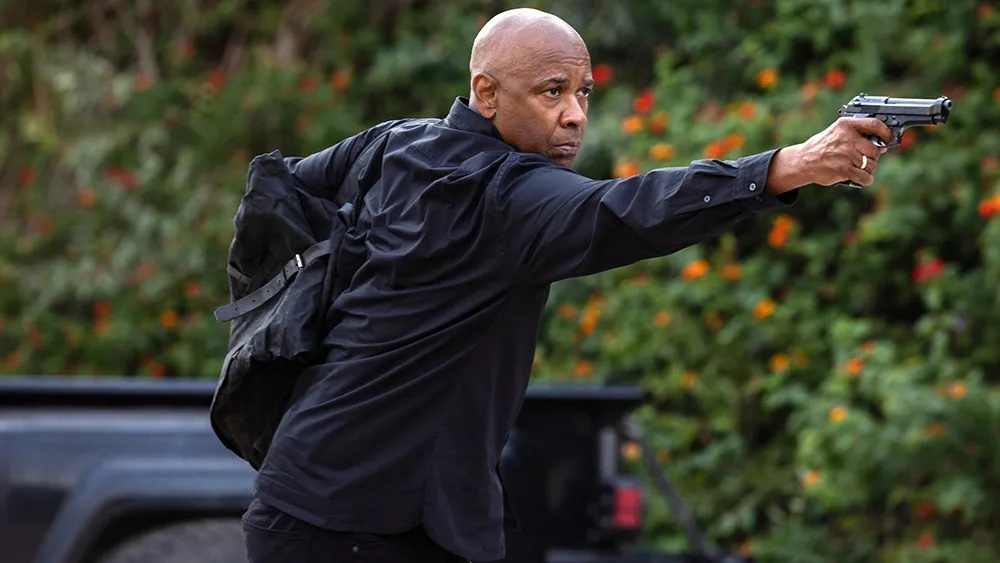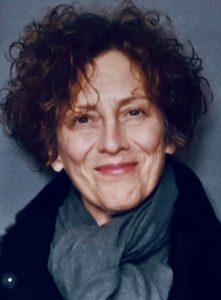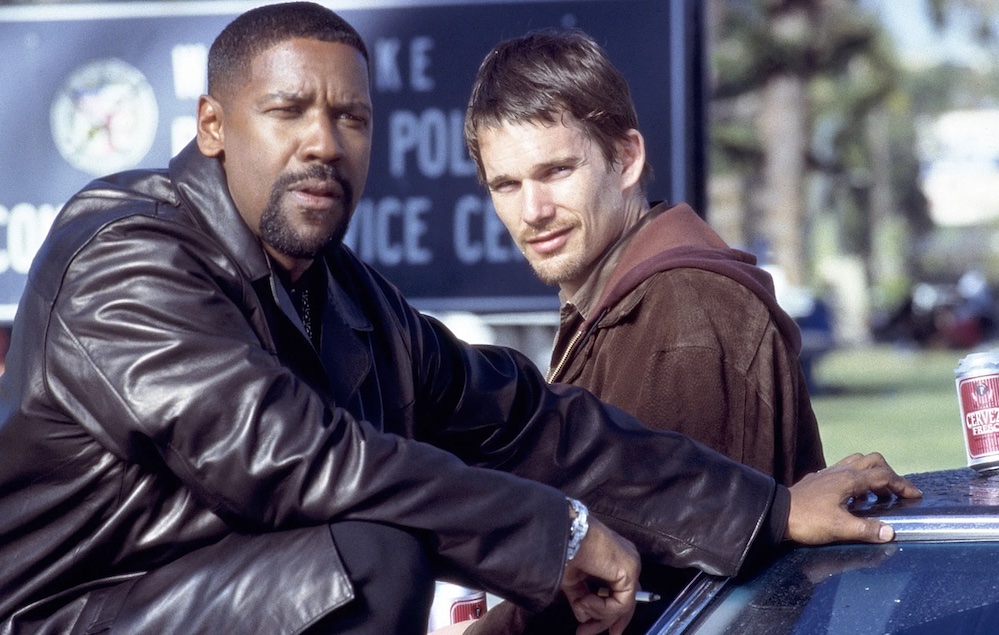
Production designer Naomi Shohan is one of the artists behind The Equalizer films. Throughout the Antoine Fuqua trilogy, the filmmaker has maintained one foot in reality while plunging the other into pure, unabashed popcorn escapism. Since Fuqua’s feature directorial debut, Shohan has played a consistent role in the filmmaker’s tangible worlds.
Their creative partnership began with The Replacement Killers, followed by collaborations on Training Day and Tears of the Sun. In the case of The Equalizer, Shohan’s artistry extended across the entire trilogy, chronicling Robert McCall’s adventures from the streets of Boston to the seaside of Italy in the third installment.
In addition to her collaborations with Fuqua, Shohan has left her mark on projects like American Beauty, Constantine, I Am Legend, and The Walk. Recently, she graciously took the time to speak with Below the Line, delving into her work in Fuqua’s filmography.
[Note: This interview has been edited for clarity and length]

Below the Line: Scouting in Italy, what qualities were you originally seeking?
Naomi Shohan: Well, the script defines the setting as a small town with a mountain behind it and the sea at its edge because it’s an old fishing town. We looked at a lot of places thinking whether we wanted to add in the mountain or add in the sea, and thereby gain maybe a different size Piazza, because obviously a lot of action takes place in the Piazza. In terms of having the mountains and the sea, really, it’s the Amalfi coast. We went up and down the Amalfi Coast.
We also traveled in Calabria to some mountain top villages, and we traveled to Puglia to the white cities that are on the very, very blue ocean, but they don’t have mountains. We finally decided, no, there’s this tiny town on the Amalfi coast called Atrani. It’s actually next to Amalfi, but one of the lesser touched places. People don’t stop there because the road just goes right by and they’re just going to Amalfi anyway.
So there’s this little tiny town, it’s a real fishing village populated by two families and just a couple of extraneous strangers, but mostly everybody is related to everybody else. There was one guy in the town who used to carry pianos up and down the steps; it’s 700 steps up to that little church you see in the movie. He told this insane story. He had an old lady die at about [step] 650, and he had to go up there and tie her to a chair, and then carry her down on his shoulder. So, it was full of that kind of lore. I mean, what could be better? It’s just an incredible little village.
BTL: Is that one of the joys of the job? Not only traveling to these places, but meeting so many characters along the way.
Shohan: Yeah, I think that my job, the great sort of fringe benefit is you get to do some anthropology field work in all kinds of different situations. I mean, I’ve been to the CDC. It’s fantastic, and you get to go into people’s houses and see the end sizes of things pretty great.
BTL: You go way back with Antoine starting with The Replacement Killers. How’d you two first connect on a creative level?
Shohan: Well, when I first met Antoine, I came in with a huge bag of books. I was thinking, oh, for this movie to be any good, it’s going to have to be really dark. I’d never met him and didn’t really know too much about him, so I was not sure how he was going to react to that idea. I broached it, and then he pulled out a book called “City of Darkness,” which is about a town in China, and it’s drenched in black, and it’s filled with garbage and wires and signage and doors. Did you see Replacement Killers?
BTL: I’ve talked to Antoine about it, actually. I think I like that movie more than he does.
Shohan: Oh, I’m so happy to hear that.
BTL: Hard not to enjoy watching Chow Yun-fat.
Shohan: Yun-fat is off the charts. Wonderful, wonderful.
BTL: When you see actors with the gravitas of Chow and Denzel walk onto your sets and these environments, does it ever change how you see the locations?
Shohan: Well, I have a good story about each of them. In Replacement Killers, we built a Buddhist temple, which is one of my favorite sets that I ever made, because all that red and the Golden Buddha. If you look at Chinese Buddhist temples that are not new, they’re ancient. There’s a very traditional architecture. There’s two rows of columns, and then on the side, there are little small shrines, and then there’s a giant shrine in the front, and there’s lots hanging from the ceiling. There’s this incredible color of red that’s super saturated, and it’s got a lot of black it, and the set had all those drenched delicious colors.
We had this big golden Buddha on the set. Chow comes onto the set and he has a handful of Joss sticks, and he lights them, and he bows to the Buddha. I was like, “You do know that’s not a real Buddha?” He’s like, “No, every image of the Buddha, it communicates what the Buddha and Buddhism communicates.”
Actually, this is the first time I’ve ever thought that, but in a really generous way he let me know that I had in fact created, if not something holy, then something that references holiness and as a compliment. It was remarkable to me. I have to say, he knew every single person’s name on that set. Every single person nobody else knew. Spectacular.
BTL: That’s nice to hear. He’s notoriously kind. As for Denzel?
Shohan: Okay, another spectacular actor, Denzel. So on this Equalizer, it was the day before filming, and my crew and I and everybody is busily working towards the following day in the piazza of this little town, getting it all finished so that we can start there the following morning. Denzel kind of lopes into the square with a couple of his people. He crosses the whole square looking around, looking happy. He sits down in front of the barbershop, where the barber plays the mandolin. When he’s not cutting hair, he sits there and plays the mandolin.
Anyway, Denzel is sitting, just taking it in and feeling good. What I wanted from this place, and what I felt when I first encountered this place was, “Oh, this is it. It’s got this intimacy and an immediate feeling of just human beings in this place.” Denzel just took it in and he was like, “This is it. This is it.” And that’s what I wanted for his character. But the fact that Denzel felt it has meant the world to me.

BTL: Thank you for those stories. It’s also nice because you and Denzel, from the sound of it, were just appreciating the movie magic of it all, too.
Shohan: I have a beautiful job. I get to explore and discover. It’s trying to really deliver this beautiful little town so that the audience will feel it in the way that I felt it, and Denzel felt it, and Antoine felt it, and [cinematographer] Bob [Richardson] felt it. And so in this case, my job was sort of just making sure all of that is working for the audience to feel what we felt. I mean, yeah, we did things to the town, but all in the spirit of bringing it forth. It’s gratifying if you feel like you’ve delivered what the atmosphere that the movie needs. It’s incredibly gratifying.
BTL: Training Day is a great example of what you’re talking about. It’s one of the best movies about Los Angeles. You can feel the authenticity in it.
Shohan: Thank you. I really have to give Antoine huge credit for that. He insisted that we follow the literal path of the script. Where the story goes is literally where we’re shooting. A lot of the time in movies, Toronto for New York, you’re not really where you are. And on Training Day, we were really there. You can’t buy that. There’s something that, I mean, yeah, we’ve all recreated it… I’ve done my best, but it’s the same for Italy, but it was so present in that movie.
And yes, I got to see an incredible side of life, and it was weird and awkward being a white woman going in to learn about a culture that I live next to, but it’s not my culture. I mean, it’s people who live in projects and what that looks like and feels like, and how possibly offensive it is for me to come in. Although everybody is always really happy to see Antoine or Denzel. But that was interesting, and it’s incredible.
I don’t want to say any word that’s too sappy, but an incredible human pleasure. It’s an incredible pleasure to see into people’s lives, and there’s an awkwardness to the fact that I’m there professionally, but then there’s a wonderfulness to be welcomed in, and there’s a deep fascination with the way other people live and how they see the world, how they even arrange stuff on a shelf, how people sometimes put a whole bunch of stuff together, and then nothing over here, that kind of thing.
BTL: I think it’s a loving portrait of Los Angeles as well.
Shohan: Well, it’s actually really good to hear because there’s classism, there’s racism, and there’s classism and me going into the territory, the blood’s territory, it is loaded with both of those things. And so, the best that I can do is bring the respect that I genuinely feel. I mean, I’m not going to say that I’m unburdened by whatever shit baggage that Americans carry, but I think, Antoine certainly and everybody in the movie, it’s just done with respect.
BTL: The respect is there. Let’s talk about cinematographer Robert Richardson. How closely do you two collaborate?
Shohan: On Emancipation, it was all natural light, so the only time we really didn’t have that was in the burning plantation when we were inside the house where fire light was enhanced from the outside, but he didn’t really add very much light, which was fantastic. What you see is what you get, because so much of it was outside.
We didn’t have a lot of lighting conversations. I discovered a lot about what he was thinking as he went about doing it. In this one, it was more sort of the regular considerations of let’s make sure that this set is dark enough, or let’s make sure that the colors work. Let’s make sure that there are plenty of apertures, so that when he and Antoine get there, they can work intuitively. My job is to provide them with a lot of options.

BTL: You must’ve been delighted by how they shot the basement where McCall is introduced. It looks fantastic.
Shohan: I too was completely bowled over when I saw how Bob lit that set. It was freaking gorgeous, and it was a catacomb for wine storage in a place that had been devoted to making wine but no longer was.
And so, the place had a lot of mystery to it, and the place had that wonderful light that was behind McCall. I saw how Bob used that and how strong the contrast was with that hard beam of light coming in and all the shadows around it, that was so gratifying. It’s really wonderful with Bob.
It’s not always used beautifully. Sometimes it’s used sort of in a way that you’re going. “No, why did they just shoot against that wall when everything else is going on here? I don’t understand that,” but that’s never been my experience with Bob.
BTL: Of course, it’s Italy, but there’s a lot of religion in this movie. Christ is everywhere, and obviously, the story deals with biblical themes. How’d religion influence some of the choices?
Shohan: At a certain point during the movie, we were in Ravello. We didn’t choose to shoot there, but it’s in the hills directly above Atrani, where we did shoot. There were a lot of churches, and I bought myself a Jewish star. I was like, “Wait a minute. I am going to come out. I just got to do this.”
But yes, Antoine and Denzel are both religious and for them both, although I would say that they’re not orthodox to any particular institution one way or another, they’re both religious, and it is, the expression [in the film] does have to do with Christianity. So, it’s authentic to both of their spirituality and it’s authentic to Italy.
It seemed absolutely right to me. I mean, I put that cross on the wall behind Denzel in that first scene we just spoke about, because it needed to be there. And for me, I put on a Jewish star because it was like, okay, this is what I am, but that doesn’t mean I totally get the reason for the iconography that’s appropriate to the aspiration of redemption in this movie.
BTL: I also love the idea, is McCall our savior? This guy who at one point punches a guy through the skull with a gun and fires away?
Shohan: Okay, now you’re treading on some interesting territory. You have to ask yourself about that, right? When people ask me about it, I’d go, “Oh, he kills a whole lot of people for all the right reasons.”
BTL: It feels very Old Testament.
Shohan: I’m glad you said that because I think it’s very American. I’m like, oh God, we’re perpetrating this thing…
BTL: It’s interesting, because Antoine’s violence is brutal, but at the end of the day, he still makes these accessible popcorn movies.
Shohan: No, they are popcorn movies, but I don’t know, can we go there in this conversation? I think Antoine has a pretty strong connection to the dark side, just understanding the darkness in human beings. In Emancipation, he would talk about that too. The Equalizer is kind of a cartoon expression of darkness. Sometimes I think about The Equalizer as that in a certain way, it’s like a cartoon, but bloodshed is cathartic.
Bloodshed is cathartic, and it’s good storytelling, and it is a release of darkness. And then you see people shoot up first graders and you’re like, what the fuck? It’s just freaking me out.
So, it’s a fine line. I mean, there’s a reason why we love to kill people in movies, and then when you see it in real life, you get a little bit worried about it. I don’t know if I’m overthinking it, but I’m sure everybody thinks about this stuff.
BTL: I think it’s something to overthink about. I like how we got to this discussion at the end. We could talk about this for hours, but I know I gotta let you go.
Shohan: Before you do, do you have a minute to tell me what you think about that?
BTL: I always think you know in your gut, is this in bad taste or not? With these movies, you know you’re watching Denzel beat up bad guys. There are the movie star and escapist elements [to distance it from reality]. I definitely don’t feel bad about enjoying watching Denzel in action.
Shohan: I don’t either, and I absolutely enjoy it. I’m trying to give you useful answers, but I think that Antoine’s understanding about human beings sort of grounds it. And then the franchise itself, it is a little bit silly. The idea of it is a little bit silly, and then Denzel is amazing, and all that seems to balance out into something fantastic that I like to watch. I really like these movies.
The Equalizer 3 is now playing in theaters.





